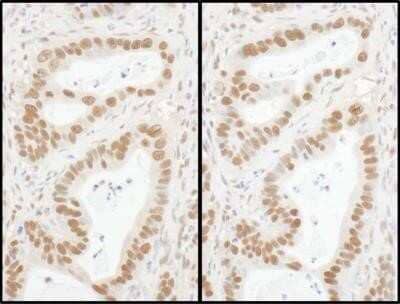Donkey anti-Goat IgG (H+L) Secondary Antibody [HRP]
Novus Biologicals, part of Bio-Techne | Catalog # NB7357


Conjugate
Catalog #
Key Product Details
Species Reactivity
Goat
Applications
ELISA, Immunocytochemistry/ Immunofluorescence, Immunohistochemistry, Immunohistochemistry-Frozen, Immunohistochemistry-Paraffin, Western Blot
Label
HRP
Antibody Source
Polyclonal Donkey IgG
Concentration
1.0 mg/ml
Product Summary for Donkey anti-Goat IgG (H+L) Secondary Antibody [HRP]
Immunogen
This Donkey anti-Goat IgG (H+L) Secondary Antibody [HRP] was developed against goat IgG-heavy and light chain.
Specificity
By immunoelectrophoresis and ELISA this Donkey anti-Goat IgG (H+L) Secondary Antibody [HRP] reacts specifically with goat IgG and with light chains common to other goat immunoglobulins. No antibody was detected against non-immunoglobulin serum proteins. This antibody may cross react with IgG from other species.
Clonality
Polyclonal
Host
Donkey
Isotype
IgG
Scientific Data Images for Donkey anti-Goat IgG (H+L) Secondary Antibody [HRP]
Western Blot: Donkey anti-Goat IgG (H+L) Secondary Antibody [HRP] [NB7357] - Analysis using Donkey anti-Goat IgG (H+L) Secondary Antibody [HRP] using Embryo.
Immunohistochemistry-Paraffin: Donkey anti-Goat IgG (H+L) Secondary Antibody [HRP] [NB7357] - Detection of human Sp1 by immunohistochemistry. Sample: FFPE section of human stomach carcinoma. Antibody: Affinity purified rabbit anti-Sp1 [NBP2-22296] used at a dilution of 1:5,000 (0.2ug/ml). Secondary Antibody: Donkey anti-Goat IgG (H+L) Secondary Antibody [HRP] [NB7357] lot 23 (left) and lot 24 (right) used at a dilution of 1:200 (5ug/ml). Detection: DAB
Applications for Donkey anti-Goat IgG (H+L) Secondary Antibody [HRP]
Application
Recommended Usage
ELISA
1:10000-1:100000
Immunocytochemistry/ Immunofluorescence
1:50 - 1:1000
Immunohistochemistry
1:50 - 1:500
Immunohistochemistry-Frozen
1:50-1:500
Immunohistochemistry-Paraffin
1:50 - 1:500
Western Blot
1:5000 - 1:50000
Please Note: Optimal dilutions of this antibody should be experimentally determined.
Formulation, Preparation, and Storage
Purification
Immunogen affinity purified
Formulation
Phosphate Buffered Saline (PBS)
Preservative
0.05% Pro-Clean 400
Concentration
1.0 mg/ml
Shipping
The product is shipped with polar packs. Upon receipt, store it immediately at the temperature recommended below.
Stability & Storage
Store at 4C. Do not freeze.
Background: IgG (H+L)
The 4 IgG subclasses, sharing 95% amino acid identity, include IgG1, IgG2, IgG3, and IgG4 for humans and IgG1, IgG2a, IgG2b, and IgG3 for mice. The relative abundance of each human subclass is 60% for IgG1, 32% for IgG2, 4% for IgG3, and 4% for IgG4. In an IgG deficiency, there may be a shortage of one or more subclasses (4).
References
1. Painter RH. (1998) Encyclopedia of Immunology (Second Edition). Elsevier. 1208-1211
2. Chapter 9 - Antibodies. (2012) Immunology for Pharmacy. Mosby 70-78
3. Schroeder H, Cavacini, L. (2010) Structure and Function of Immunoglobulins. J Allergy Clin Immunol. 125(2 0 2): S41-S52. PMID: 20176268
4. Vidarsson G, Dekkers G, Rispens T. (2014) IgG subclasses and allotypes: from structure to effector functions. Front Immunol. 5:520. PMID: 25368619
Additional IgG (H+L) Products
Product Documents for Donkey anti-Goat IgG (H+L) Secondary Antibody [HRP]
Product Specific Notices for Donkey anti-Goat IgG (H+L) Secondary Antibody [HRP]
This product is for research use only and is not approved for use in humans or in clinical diagnosis. Secondary Antibodies are guaranteed for 1 year from date of receipt.
